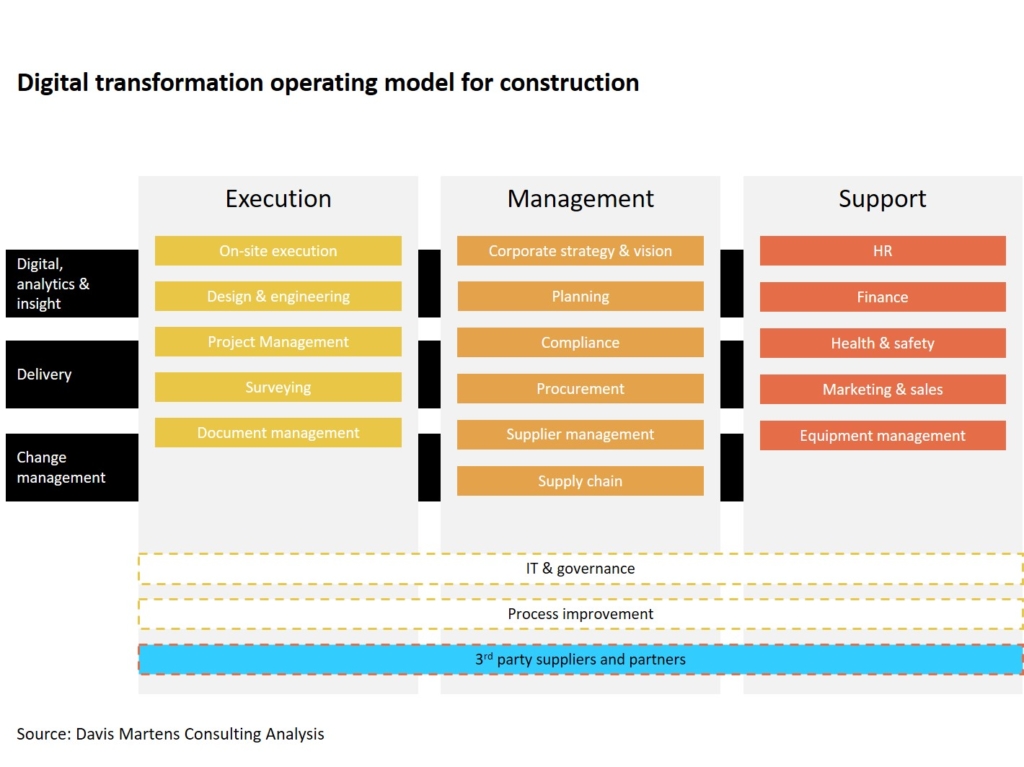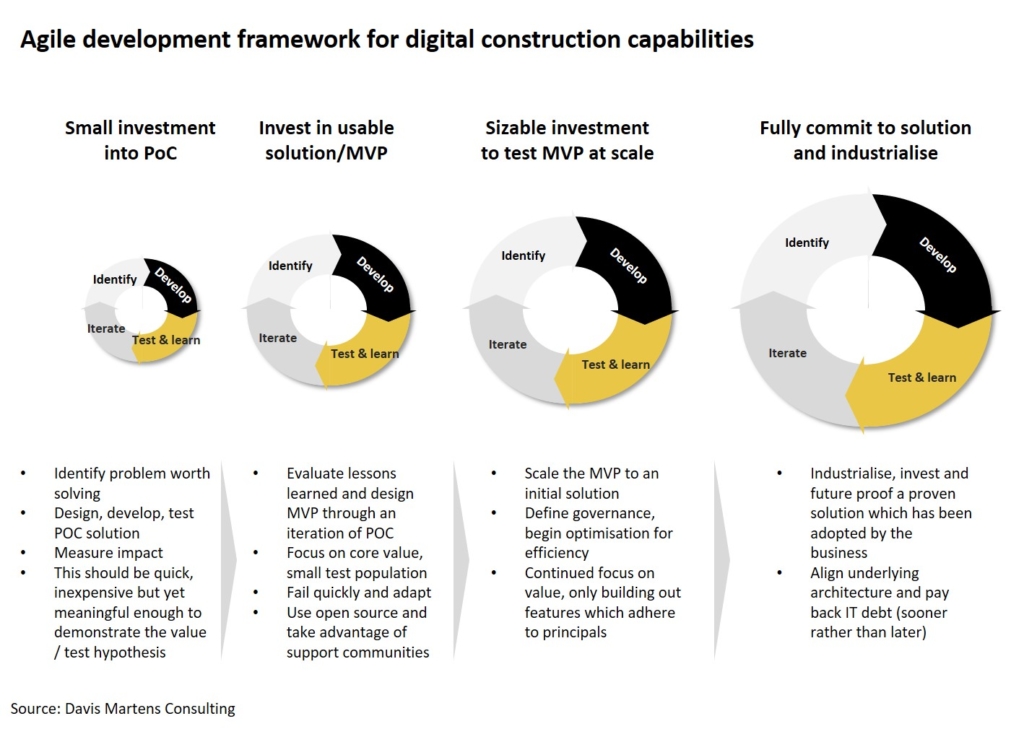
The future operating model for digital construction firms
Digital construction is the answer to return back to prosperity however most firms have yet to start the journey. The operating model to enable digital transformation is one of they key components to realise the value of new technology.
- It is no secret, the construction industry has struggled over recent years, low productivity, project overruns, increasing project complexity and virtually non-existent profit margins have been the result of changing market dynamics.
- The combined profit margin of the top 10 construction firms in the UK was a shocking 0.2% in 2017, while accounting for 49% of revenue (£36bn) of the top 100 construction firms.
- Today, organisations face a unique challenge to transform traditional operations and embrace digital construction in an environment ruled by bricks and mortar for their survival.
- Target operating models enabling digital collaboration, data and analytics will allow leading construction companies to stay competitive, improve productivity, lower their cost base and increase profitability.
The operating model to enable digital construction
- Technology is undoubtedly the future of construction operations, however most firms today don’t have the relevant capabilities to capitalise on solutions solving the businesses most critical problems.
- The org-models of competitive organisation in the future will be very different from traditional construction firms and put their incumbents at a significant disadvantage both in terms of competing for new business as well as time to project completion.
- Competitive constructions firms will have to start investing in technical talent which can facilitate a digital operating model.
- Outsourcing technical expertise to partners and 3rd party suppliers is often cost effective but creates a large dependency on partners and loss of control in the operational value chain.
- Instead, the transformation road-map should be accelerated through the support of 3rd party suppliers, using them accelerate the development of internal capabilities and industrialise these.

- Leaders in construction now need to consider how to build digitally enabled teams, which will improve performance, productivity and profitability.
- Competitive organisations approach digital with a clear and definitive strategy which is outcome focused and data driven.
- A key consideration is the transformation road-map, companies often invest heavily upfront in expensive enterprise solutions and struggle to achieve a return on their investment, because the objectives are lost throughout long technical implementation phases.
- Modern construction organisations take an agile approach to building their capabilities and scale solutions through iterations.
Case study
Digital collaboration and project management
A leading construction firm in the UK is using QR codes throughout its building sites as a digital collaboration, workflow tracking and project management system.
It allows project managers, workers and contractors to scan QR codes on a mobile app which brings up the work completed, and work left outstanding on a particular part of the site and updates information in real-time.
The company was able eliminate the need for paper based documentation, and time consuming physical document. The result was an increase in management productivity of 8-10% and 35% reduction in errors through real-time information sharing.
Enabling the transformation journey
- Having a clear approach on how to fund the transformation journey is important, competitive firms will set out a clear framework within their strategy before they begin, which outlines, how to develop the business case, fund the project and evaluate return on investment.
- Construction firms today must identify critical business problems which are worth solving through a digital solution. Firms which are unable to identify and prioritise problems, will experience costly failures throughout their transformation journey.
- Innovative organisations will start small, through proof of concepts which are focused on problems worth solving and scale the solutions which meet previously defined success criteria through iterations to ensure value is created with each iteration in an agile way.

- Because constructions firms today have limited digital capabilities, following a partnership model to scale up capabilities is the most effective approach to quickly absorb capabilities, however organisations must be disciplined and absorb and industrialise partner capabilities rather than outsourcing work.
- Relying on partners without building in-house capabilities will lead to loss of control throughout the operation and costly partner dependencies.
- Winning operating models of the future will take full advantage of open source technologies, combined with specialist skills and targeted partner capabilities to enable the digital journey.
There is no time like the present
- Turning constructions operations digital is a complicated endeavour and requires a clear strategy, precision and careful planning but the potential benefits are enormous if executed correctly.
- Constructions executives are encouraged to start the journey towards digital construction and invest small in big ideas until value is proven.
- It will take time to transform an organisation which is based on bricks and mortar, and it is important to start now and grow solutions organically to ensure buy-in and support throughout the organisation.
- There is an endless list of solutions on the market, deciding which solutions to invest in, using a clear strategy, objectives and success criteria is fundamental competency of tomorrows construction leaders.
- Constructions firms are unique and complex, competitive firms need to align themselves to partners who understand their business and can help the acceleration towards profitability, productivity and success fully leveraging digital capabilities available in the market.
If you would like find out how we can help your business, contact us below